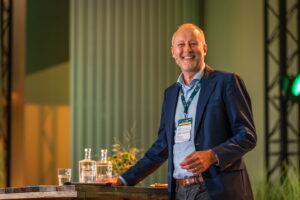Honouring Herr Köpp with the Alfred Toepfer Medal
Michael Hošek awards Dr. Matthias Köpp the Alfred Toepfer Medal honouring his late father at the EUROPARC Conference 2023. Picture: PDF-Grafie
The Alfred Toepfer Medal, named after the founder of the EUROPARC Federation, Dr h.c. Alfred Toepfer (1894-1993), is awarded annually in recognition of a particular individual who has made a significant contribution to nature protection in Europe. In 2023 it was awarded to honour the late Prof. Dr. Hans Köpp, whose son Dr. Matthias Köpp accepted the award on his behalf.
Honouring the legacy of Herr Köpp
As 2023 marks the 50th Anniversary of the EUROPARC Federation, our Council agreed the 2023 Alfred Toepfer Medal should be awarded to someone whose work has been fundamental to our organisation. That is why it was clear that this year’s Alfred Toepfer Medal should be awarded to Prof. Dr. Hans Köpp, who worked alongside Alfred Toepfer in EUROPARC’s formative years in the 1970s. The EUROPARC Directorate was fortunate enough to interview Herr Köpp at the end of 2022, in his home in Göttingen.
As such, it was with great sadness, that we were informed that Herr Köpp passed away in June. His contribution to the EUROPARC Federation, especially as editor of the Bulletin, cannot be underestimated and our network will forever hold him in high regard.
We were fortunate enough, to be able to invite his son Dr. Matthias Köpp to accept the award in his fathers’ behalf during the Award Ceremony at the EUROPARC Conference 2023 in Leeuwarden.
A childhood marked by the Federation
In his acceptance speech, Matthias recalled how strongly his childhood has been marked by the Federation. From walks with his father and Alfred Toepfer, to summer holidays spent in the various Parks and Protected Areas of Europe: Herr Köpp was incredibly dedicated to both the Federation and Alfred Toepfer, and this too influenced the life with his family.
We invite you now, to read the wonderful acceptance speech written by Matthias. In his own words, discover what the Federation meant to his father, and still means to him. We sincerely thank Dr. Matthias Köpp for being with us in Leeuwarden, and for sharing his beautiful words with the network.
“Dear EUROPARC Directorate, dear Mr. Andreas Holz of the “Alfred-Toepfer-Foundation”, dear Members of EUROPARC Federation,
Thank you for inviting me as your guest tonight. It is such an honour for me to be here to receive the “Alfred Toepfer Medal” on behalf of my father. After he was invited to give an interview to the EUROPARC Federation for its 50th anniversary last autumn, he planned to be here himself to attend your conference. Of course, he did not know by then that he would be honoured in this way. Whether he suspected or hoped for it? I do not know. He missed this honourable news in June by only a few days.
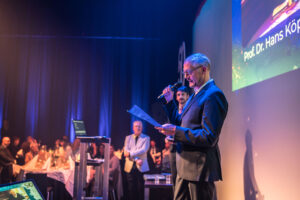
Matthias Köpp. Picture by PDF-Grafie.
Now I may be here in his place, and although I am not a professional colleague of yours – I am a psychiatrist and psychotherapist – it does not feel at all strange for me to be with you. On the contrary! First of all Alfred Toepfer, the founder of this medal is no stranger for me. This is not only because I live in Hamburg nowadays, where his name is ever present. I remember a walk with him and my father with some official group in what must have been the late 1970s through “Lüneburger Heide Nature Park”, from Niederhaverbek to Wilsede. In my memories Toepfer was a relatively small man already in his early 80s, but very good on foot indeed.
Even further back in time now. Shortly after my father completed his PhD at Göttingen University in 1966, he went to England for a year to complete a program for foreign scholars at the Department of Forestry and Agriculture at Oxford University. He finished the program with a thesis on “Problems and politics in the creation of National Parks in Great Britain: a comparison with West German experiences”. So his interest for protected areas goes back at least until then. And it so happened that I was born in Oxford, and my parents took me in their VW Beetle, as a baby boy, on a trip through all the British National Parks. A photo with me on a blanket in beautiful surroundings still exists.
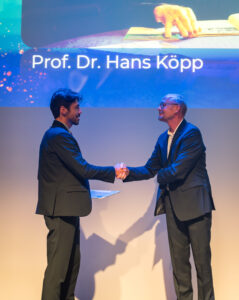
Michael Hošek and Dr. Matthias Köpp. Picture: PDF-Grafie.
Later, our family spent their vacation almost exclusively where the EUROPARC Federation held its annual meetings. While Hans was attending the conferences, our mother, my younger brother and I were on holiday, and part of the story is as well, that we often didn’t see much of him… But that’s how I got through so many European National Parks. I remember visits especially to the “Peak District” in North Yorkshire, to the Bavarian Forest, to the Dutch island of Texel and to Lake Vättern in Sweden. Special personal memories of mine are connected with “Plitvice National Park” in Croatia in what was then Yugoslavia. For us, that was behind the “Iron Curtain” of a divided Europe, and far from an everyday experience. After two or three weeks of vacation on a small farm and in spectacular nature, our family spent the last evening with the then director Josip Movcan, his wife Maria and his daughter Jasna, and I said “but I do not want to go home”. Without further ado, it was decided that I, by then a boy of twelve, would simply stay for another week with Josip’s family, who afterwards put me on a plane home in Zagreb. And further on, I spent the following summer all alone with Josip’s family in Plitvice.
You can for sure imagine what a pleasure it was for me to be able to watch your interview with my father on YouTube recently. And from my own professional point of view it was of special pleasure to hear that he emphasized the aspect of connecting people as a central task for EUROPARC Federation’s future work. One of your mottos is “connecting people with nature”. I might suggest that you quote “connecting people in nature” as well. Maybe my personal memories can help prove that, at least concerning me, you already did!
With this in mind, I would like to take the opportunity to congratulate you on your fiftieth birthday and wish you all the best and success for your future work. As you heard my father saying in the interview, he was convinced that on its hundredth birthday, EUROPARC Federation will still be there and no less necessary or important than it was in 1973.
Thank you very much!”
The Alfred Toepfer Medal is made possible thanks to the generous support of the Alfred Toepfer Stiftung.
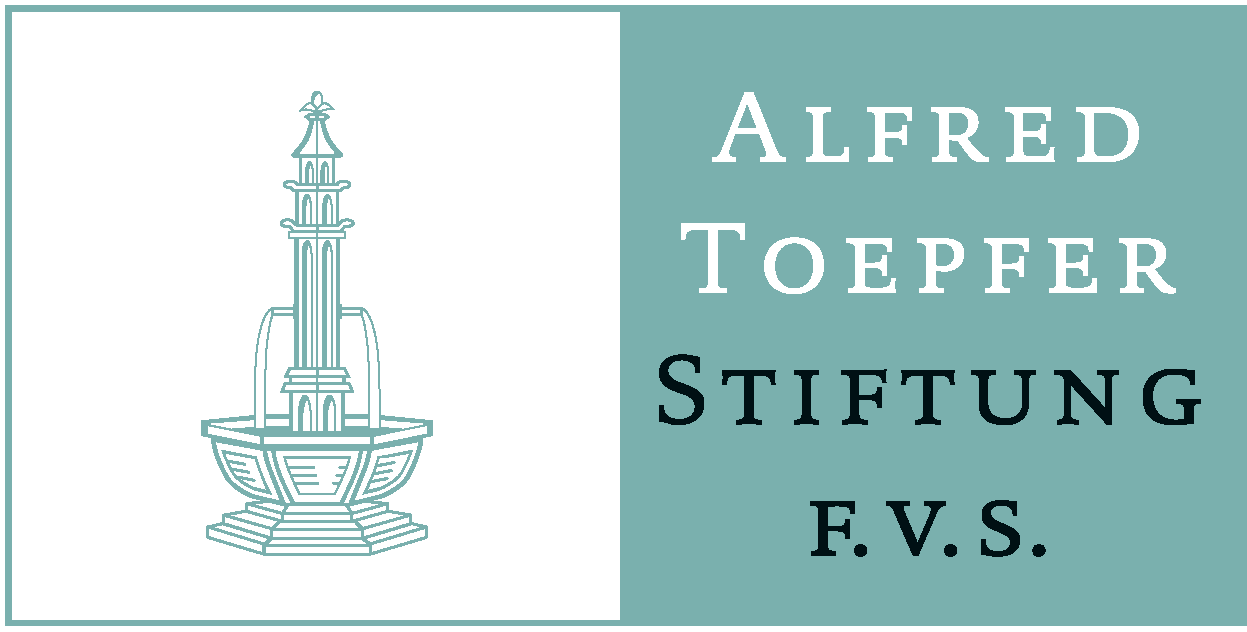
Meet the Alfred Toepfer Scholarship winners 2023!
From left to right: Andreas Holz of the Alfred Toepfer Siftung, Lucia Ursu, Emmanuele Déon, Hayden Bridgeman and EUROPARC President Michael Hošek. Picture by PDF-Grafie for the EUROPARC Federation.
Every year, the EUROPARC Federation grants three scholarships to young professionals, in order for them to conduct study visits on their chosen topic. Get to know the three winners of 2023! The scholarships are made possible thanks to the generous support of the Alfred Toepfer Stiftung.
About the Alfred Toepfer Natural Heritage Scholarship
EUROPARC strongly believes that young professionals have a vital role to play in caring for Europe’s natural heritage. Like everything else, the future of Protected Areas relies on the young generation taking an active and informed role. Each year the EUROPARC Federation, with support from the Alfred Toepfer Stiftung F.V.S., awards three Alfred Toepfer Natural Heritage Scholarships to promising young conservationists, who are committed to working for the benefit of Protected Areas. The aim of the scholarships is to enhance international cooperation and to advance the quality, innovation and European dimension of Protected Area management. Meet the winners of the 2023 edition:
Emmanuelle Déon
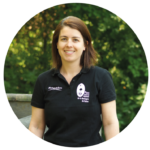
Emmanuelle
“My name is Emmanuelle Déon and I work as a Sustainable tourism project manager for Montagne de Reims Regional Park. My role is to engage with stakeholders in developing projects that make the Park more accessible to visitors, mainly through outdoor activities and soft mobilities. Tourism and leisure in Parks are a great way to raise people’s awareness of the beauty of nature, but are also challenging because we have to make sure that these activities don’t result in negative environmental impacts. My scholarship project is to study how Parks can get involved in developing social tourism, for a more inclusive and equitable access to sustainable tourism towards people in risk of poverty. I have a strong interest in the social pillar of sustainability because I believe it is our collective responsibility, as a society, to care for the most vulnerable populations. I aim at visiting several Protected Areas in Europe which have worked on this issue, in order to identify and disseminate best practices within European Parks.”
Hayden Bridgeman

Hayden
“My name is Hayden Bridgeman and I am North Area Ranger for the New Forest National Park Authority. My role is to help visitors and locals learn about what makes the National Park special, how they can enjoy the area, and offer advice about how to help protect it. I have a huge passion for making nature inclusive, and believe that everybody should be able to access green spaces. We, as a society, are increasingly aware of how crucial nature is to good mental health, yet those that need it most are often unable to access it. I am currently leading on a local initiative to enable refugees to access the UK’s National Parks and I want to continue to learn how I can remove more of the barriers this community faces when accessing nature. This scholarship allows me to learn from other professionals about some of the opportunities they have created in their Protected Areas for marginalised communities. I am so grateful for this opportunity and hope my findings will be useful to my European colleagues.”
Lucia Ursu
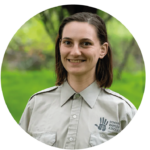
Lucia
“My name is Lucia Ursu. As an educator in Protected Areas, I have witnessed first-hand the vital role that parks play in promoting sustainable development and preserving our natural heritage. I strongly believe that Education for Sustainable Development (ESD) is crucial in our efforts to create a more sustainable future not just for Protected Areas but for nature in general. Through ESD we can change perspectives and shift attitudes towards more sustainable behaviours. Being an Alfred Toepfer Natural Heritage Scholarship winner brings me a unique opportunity to further develop my skills and knowledge in the field of ESD, enables me to expand my expertise and deepen my understanding of ESD and lets me connect with other professionals working towards a more sustainable future. I am committed to using the knowledge and skills I gain through the scholarship to make a positive impact in my community and beyond, and to contribute to the achievement of the Sustainable Development Goals.”
Save the date: Siggen Seminar 2024 on Marine Protected Areas
EUROPARC’s Siggen Seminar is a free of charge training event organised annually by EUROPARC. In 2024, we will focus on Management Effectiveness in Marine Protected Areas.
- 4.03. – 06.03.2024
- Gut Siggen, Heringsdorf, Germany.
- Save the date!
Registration has opened – please go here for all info.
Catching the wave: How to achieve more effective management in Marine Protected Areas
To protect the EU’s seas, the EU Biodiversity Strategy for 2030 set the target that, by 2030, at least 30% of the sea area should be legally protected (with 10% of the sea area to be strictly protected). This is also in line with the Global 30×30 objectives. As such, Marine Protected Areas (MPAs) will have an important role to play in these policy frameworks.
Management effectiveness is crucial to achieve both these global targets, and the conservation objectives that MPAs are designated for. The assessment of management effectiveness of MPAs has proved to be a key component of MPA management. To support our members, the EUROPARC Siggen Seminar will focus on this topic in 2024.
We are currently working on a detailed programme. Registration will open in the following months. For now: save the date!
Seminar objectives
With this seminar, we aim to:
- Increase participant’s knowledge on why management effectiveness is at the core of EU conservation strategies;
- Share experience on main challenges that undermine effective management of MPAs;
- Acquire knowledge on some of the most common/recommended indicators to assess management effectiveness.
For whom?
Our target audience is Marine Protected Area managers from Europe. If you are already working on a Management Plan, or implementing one, we would love to hear from your experience! We will ask participants if they have any interesting case studies that they can share with the group. We estimate 15 – 20 participants.
Dates
- Arrival on Monday 4.03. The seminar starts in the evening.
- Tuesday 4.03: full day seminar
- Morning of Wednesday 5.03: seminar. After lunch: departure.
Costs
The Siggen Seminar is free of charge for EUROPARC members. This includes participation in the Seminar, accommodation, and meals (breakfast, lunch, dinner). Non-members may register, but if chosen, a small fee would be charged.

EUROPARC’s Siggen Seminar is made possible thanks to the generous support of the Alfred Toepfer Foundation. The support of Alfred Toepfer Foundation is highly appreciated by EUROPARC Federation and the continuation of the annual seminars will ensure that all members can actively contribute to the ongoing strategic development of the Federation.
#EUROPARC2023 – Conference Statement: The time to act is now!
During the EUROPARC Conference 2023, a special Conference Statement was produced. The statement underlines that to properly deal with the crisis we are currently facing, we need to listen to nature and create links with the wider society.
Creation of the statement EUROPARC Conference 2023
The EUROPARC Network is ready to create a future in harmony with nature. This message was echoed loud and clear after our annual Conference, taking place from 3 – 6 October in Leeuwarden, The Netherlands. Over 450 nature professionals gathered to dive into the theme of the week: Tribute to our Landscape – Where nature and people meet in Harmony.
To ensure a lasting impact, as well as to underline the united voice of the EUROPARC Network, a Conference Statement was created.
Jan van de Venis, picture by PDF-Grafie
This work was spearheaded by Jan van de Venis, president of the National Park Dunes of Texel, and part of the EC2023 organisational team, as well as EUROPARC’s Executive Director Carol Ritchie.
Through seven ‘steps’, the statement serves both as an inspiration, as well as a practical guide on how Europe’s Protected Areas can lead the way to a greener, healthier and harmonised future.
The statement was created for and by Conference participants. During an interactive session on Friday afternoon, participants were asked to come up with actions that can bring the Conference Statement to life. Some of these planned activities include:
- Promote volunteering opportunities to connect people to nature;
- Connect sporting groups with nature;
- Share personal ‘magical nature moments’ with others;
- Creating peer-to-peer learning spaces for all ages;
- Be the change you want to see.
We invite our members and the wider EUROPARC network to take the Conference statement further and turn it into reality!
Read the Statement now:
“Our conference theme is “Tribute to our landscape, where nature and people meet in harmony”. Celebrating 50 years of the EUROPARC Federation in 2023, the Leeuwarden Conference is a highlight. We invite participants to learn from our past and prepare for the future. We see nature’s decline, biodiversity loss, climate change, food concerns, and other worries about our planet. The conference makes a clear statement of intent and action to bring harmony between nature and people.
1. Past – Present – Future
Understanding our past and present helps us to work towards the future: the future we need and want. The connection between nature and culture manifests in diverse landscapes that change over time, whilst respecting our natural heritage and all life. Preserving landscapes’ core values for the future reconfirms and conserves our link to previous generations.
2. Harmony with Nature
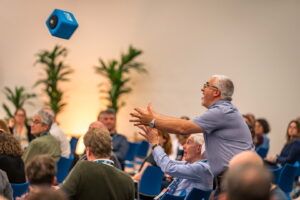
Participants could provide feedback during an interactive session. Picture: PDF-Grafie
Living in harmony with nature, a stable climate and no pollution, requires a change in human attitudes and actions. We recognise the impact of humans on the landscape and nature and current dis-harmony that exists between people and non-human nature in many places in Europe. Many people and cultures have forgotten or lost their place within global ecosystems. Climate and biodiversity cannot wait any longer: we stress that nature is the foundation of our existence.
3. Contact and interconnectedness with nature
Go out there and spend time in nature. We have different experiences and backgrounds. However, appreciating nature and all its diversity is crucial to recognise its value to human society. Storytelling can inspire a growing understanding of nature’s importance for our health, food, water and air. Share beautiful and connecting stories.
4. Knowledge
Even if humans know about nature, they tend not to act accordingly. Scientific knowledge and practical experience often stay in closed circles, instead of reaching out to people, beyond a “green bubble”. There is a need to reach consumers, business owners or other stakeholders. Behaviour change is necessary.
5. Be Amazed, Protect and Educate
Continue to marvel at nature and landscape beauty. Protected Areas have an essential educational role in reconnecting society with nature. You want to protect what you know and love. We need comprehensive approaches and cooperation to foster continuous environmental protection and nature education at European, national and regional levels. We need to work with the education sector to learn together – to share more between those knowledgeable in nature, heritage interpretation, environment and other areas.
6. Everywhere and all of the time
Nature exists everywhere: in natural areas, cultural landscapes, cities and towns – they are all connected. We should seek better links between such areas, by collaborating with managers, users, residents and other organisations. New technology can help, but it should be supportive rather than controlling.
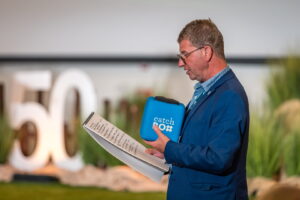
Participants could provide feedback during an interactive session. Picture: PDF-Grafie
7. Start and act now
We know that our landscapes face many challenges: overexploitation, intensification of uses, pollution, biodiversity loss, effects of climate change and loss of cultural heritage. Protected landscapes need to be pilot areas for integrated solutions. Let’s take the action needed now to move from fear towards hope. Creating a better, more natural world together must begin now. Not only should we focus on our current perspectives, we need intergenerational interaction where young and old learn together, share achievements and improvements, for a common future. A roadmap for change is needed, with everyone playing a role, individually and collaboratively.
50 years of EUROPARC have passed.
May the next 50 years of EUROPARC bring us towards a more mature relationship in harmony with nature. For present and future generations. For all life.”
We thank all that have contributed to the creation of this statement.
